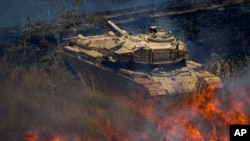BEIRUT —
The United Nations launched a record $5.1 billion appeal last month to cope with the burgeoning humanitarian crisis of the Syrian civil war and among the agencies desperately needing replenishment is the World Food Program.
The World Food Program needs more money, and in less than two months will have exhausted its funding for an operation that is feeding 2.5 million people inside war-torn Syria and more than a million who have sought refuge in neighboring countries.
WFP director Ertharin Cousin spoke to VOA during a recent overnight stop in Beirut after holding meetings in Damascus with senior Syrian government officials. The highest-ranking U.N. official to have been in the Syrian capital for several months said the biggest challenge right now is covering the costs of feeding millions of Syrians.
“We have enough right now to support our activities until the end of August, the 1st September,” she explained. “We are on the phone every single day talking to donors. And as it comes in, it goes out. And we will continue to keep our pipeline robust for as long as the donors continue to invest in our work.”
She projects that by the end of the year four million inside Syria and three million outside will need emergency feeding, costing the WFP $168 million a month.
But money is not her only preoccupation. The WFP head slipped into Damascus to hold talks with Syrian government officials to ensure freer access for her agency and more than 20 partner non-governmental organizations that help distribute the agency’s food. In recent weeks WFP has had food distribution disrupted at government checkpoints and by the jihadist group al-Nusra front.
“In the meetings with government my message was a very direct one and that is that we must have access, and we need the government to ensure that they do nothing to impede our access nor should anyone in the opposition do anything to impede our access,” Cousin said. “And that we are going to talk to the government and we are going to talk to everyone else who’s involved in this conflict to ensure that we have the humanitarian access that we need so that people don’t go hungry."
Cousin said she made clear to Syrian officials that she did not want to get involved in discussions on the political situation in the war-torn country. “Of course they raised political issues. They were very quick to understand my reluctance to participate in any political conversations because that’s not what I came for. There’re lots of people spending a great deal of time debating the political issues and working to find the political solutions,” she stated. “We deal with the fallout of the lack of a political solution.”
Cousin said she admires the courage of the more than 100 WFP staffers inside Syria and she said she has to evaluate from time to time whether to evacuate them because of the high risks. “You consider it because you have the responsibility to consider all ‘the what ifs’ but we recognize that if we leave, people will go hungry,” she said. “I work with people who humble me every single day because they are committed to being where people need them whether it was in Darfur, Iraq, Afghanistan or now in Syria.”
Despite intensified shelling in Damascus her staff insists on staying.
The World Food Program needs more money, and in less than two months will have exhausted its funding for an operation that is feeding 2.5 million people inside war-torn Syria and more than a million who have sought refuge in neighboring countries.
WFP director Ertharin Cousin spoke to VOA during a recent overnight stop in Beirut after holding meetings in Damascus with senior Syrian government officials. The highest-ranking U.N. official to have been in the Syrian capital for several months said the biggest challenge right now is covering the costs of feeding millions of Syrians.
“We have enough right now to support our activities until the end of August, the 1st September,” she explained. “We are on the phone every single day talking to donors. And as it comes in, it goes out. And we will continue to keep our pipeline robust for as long as the donors continue to invest in our work.”
She projects that by the end of the year four million inside Syria and three million outside will need emergency feeding, costing the WFP $168 million a month.
But money is not her only preoccupation. The WFP head slipped into Damascus to hold talks with Syrian government officials to ensure freer access for her agency and more than 20 partner non-governmental organizations that help distribute the agency’s food. In recent weeks WFP has had food distribution disrupted at government checkpoints and by the jihadist group al-Nusra front.
“In the meetings with government my message was a very direct one and that is that we must have access, and we need the government to ensure that they do nothing to impede our access nor should anyone in the opposition do anything to impede our access,” Cousin said. “And that we are going to talk to the government and we are going to talk to everyone else who’s involved in this conflict to ensure that we have the humanitarian access that we need so that people don’t go hungry."
Cousin said she made clear to Syrian officials that she did not want to get involved in discussions on the political situation in the war-torn country. “Of course they raised political issues. They were very quick to understand my reluctance to participate in any political conversations because that’s not what I came for. There’re lots of people spending a great deal of time debating the political issues and working to find the political solutions,” she stated. “We deal with the fallout of the lack of a political solution.”
Cousin said she admires the courage of the more than 100 WFP staffers inside Syria and she said she has to evaluate from time to time whether to evacuate them because of the high risks. “You consider it because you have the responsibility to consider all ‘the what ifs’ but we recognize that if we leave, people will go hungry,” she said. “I work with people who humble me every single day because they are committed to being where people need them whether it was in Darfur, Iraq, Afghanistan or now in Syria.”
Despite intensified shelling in Damascus her staff insists on staying.





